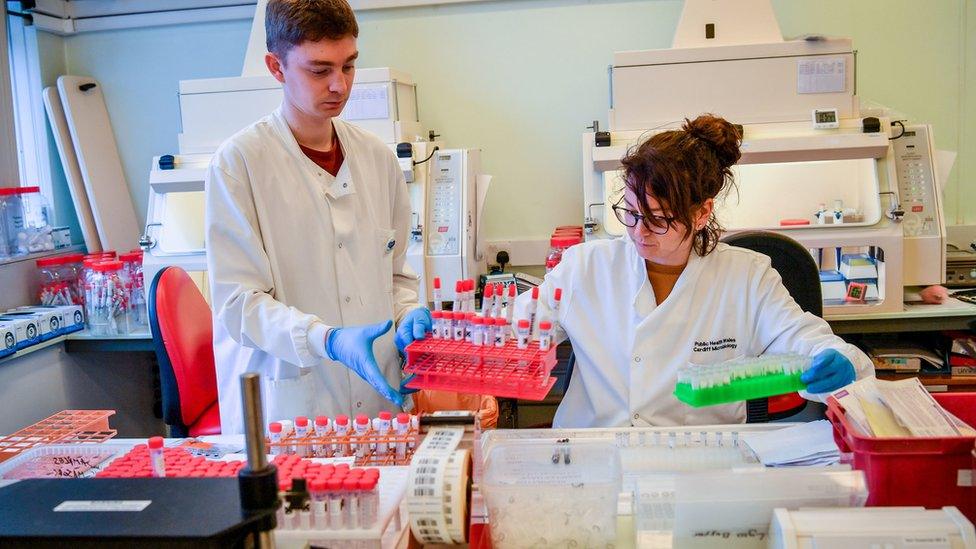Coronavirus: Lack of testing becomes political problem
- Published

Staff at the University Hospital of Wales in Cardiff carrying out a diagnostic test for coronavirus earlier this month
Why does the government appear to be in such a mess over testing for the coronavirus?
It's a simple question. The consequences of the delays are clear.
Some NHS staff who might actually be well are off work just in case, when they are desperately needed.
Many other workers who suspect they might have had the disease are stuck at home too, when if there was a test available they might get the all clear and be able to participate again in the economy.
And of course, the lack of tests makes it harder to track the progress of the disease.
To borrow an old business phrase, if you're not measuring it, you're not managing it.
If it's easy to see why expanding testing is so important, why isn't it easy for the government simply to make it happen?
Of course, buying tests for coronavirus is a lot more complicated than popping out to the chemist to buy a pregnancy test or a packet of paracetamol. This is a new disease. There is a well-documented shortage of the tests worldwide and lots of countries are scrambling to buy them as fast as they can.
But if every country is in the same race, why is the UK well behind countries like Germany and South Korea in its rates of testing, and compared to other smaller European countries, behind relative to the size of our population?
It is worth saying that the UK has tested more than Japan and at a similar rate to France but ministers have been promising to "ramp up" testing for many days now and progress, as the diseases advances, seems to be far too slow.
The government admitted yesterday that it was having real problems placing its hands on the tests, blaming the global shortage of the required chemicals.

A SIMPLE GUIDE: How do I protect myself?
AVOIDING CONTACT: The rules on self-isolation and exercise
LOOK-UP TOOL: Check cases in your area
MAPS AND CHARTS: Visual guide to the outbreak
VIDEO: The 20-second hand wash

But then there was confusion last night when it was suggested that there is no shortage of the raw materials required to make the 'reagents' needed for the tests in the UK.
Opposition figures suggested that the government simply hadn't made a request to UK manufacturers to produce the extra amounts required. But it's not just about the availability of raw materials but about the machines required to process the testing kits.
Industry sources say that some testing kits only work with particular kinds of machines, so the government is frantically trying to look for more generic equipment that could be used in different situations. And there's a call this morning for the NHS to make its lab space available to ease the pressure which might help.
But those issues have been the same since the start of all this. As the coronavirus took hold in China, it was, according to one government source, "not unforeseeable" that the UK would need to scale up testing capacity dramatically.
And ministers and the various arms of the health system haven't helped themselves by sometimes releasing contradictory testing numbers.
What then can explain the struggle?
One senior opposition politician tells me that there are two firms in the UK who have the capacity to make the tests from start to finish quickly but down to what they describe as a "lack of management systems" in the NHS, that simply hasn't happened.
There is the general sense that Whitehall has struggled to make a complicated system work swiftly too.
But some government insiders admit now that the UK was simply too slow to grip the need.
There is certainly frustration in Westminster that, despite a big political push to try to solve this, progress is slow.
The explanation is a complicated one.
But the lack of testing is rapidly becoming a straightforward political problem.
